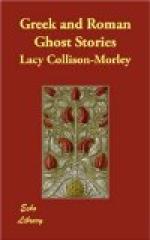Caracalla, besides his bodily illnesses, was obviously insane and often troubled with delusions, imagining that he was being driven out by his father and also by his brother Geta, whom he had murdered in his mother’s arms, and that they pursued him with drawn swords in their hands. At last, as a desperate resource, he endeavoured to find a cure by means of necromancy, and called up, among others, the shade of his father, Septimius Severus, as well as that of Commodus. But they all refused to speak to him, with the exception of Commodus; and it was even rumoured that the shade of Severus was accompanied by that of the murdered Geta, though it had not been evoked by Caracalla. Nor had Commodus any comfort for him. He only terrified the suffering Emperor the more by his ominous words.[72]
Philostratus[73] has described for us a famous interview which Apollonius of Tyana maintained that he had had with the shade of Achilles. The philosopher related that it was not by digging a trench nor by shedding the blood of rams, like Odysseus, that he raised the ghost of Achilles; but by prayers such as the Indians are said to make to their heroes. In his prayer to Achilles he said that, unlike most men, he did not believe that the great warrior was dead, any more than his master Pythagoras had done; and he begged him to show himself. Then there was a slight earthquake shock, and a beautiful youth stood before him, nine feet in height, wearing a Thessalian cloak. He did not look like a boaster, as some men had thought him, and his expression, if grim, was not unpleasant. No words could describe his beauty, which surpassed anything imaginable. Meanwhile he had grown to be twenty feet high, and his beauty increased in proportion. His hair he had never cut. Apollonius was allowed to ask him five questions, and accordingly asked for information on five of the most knotty points in the history of the Trojan War—whether Helen was really in Troy, why Homer never mentions Palamedes, etc. Achilles answered him fully and correctly in each instance. Then suddenly the cock crew, and, like Hamlet’s father, he vanished from Apollonius’s sight.
FOOTNOTES:
[Footnote 44: N.H., 30. 1. 16.]
[Footnote 45: Hymn. Orph., 18. 15.]
[Footnote 46: Soph., O.C., 1590.]
[Footnote 47: Cic., Verr., iv. 107.]
[Footnote 48: Diodor., v. 4. 2.]
[Footnote 49: Cp. Gruppe, Griechische Mythologie und Religionsgeschichte, p. 815, where the whole question is discussed in great detail.]
[Footnote 50: Strabo, 13. 29, 30; Pliny, N.H., 2. 208.]
[Footnote 51: De Div., i. 79.]
[Footnote 52: Strabo, 14, 636; 12, 579.]
[Footnote 53: Paus., 3. 17, 19.]
[Footnote 54: Herod., v. 92.]
[Footnote 55: Dial. Deor., 7. 4.]




